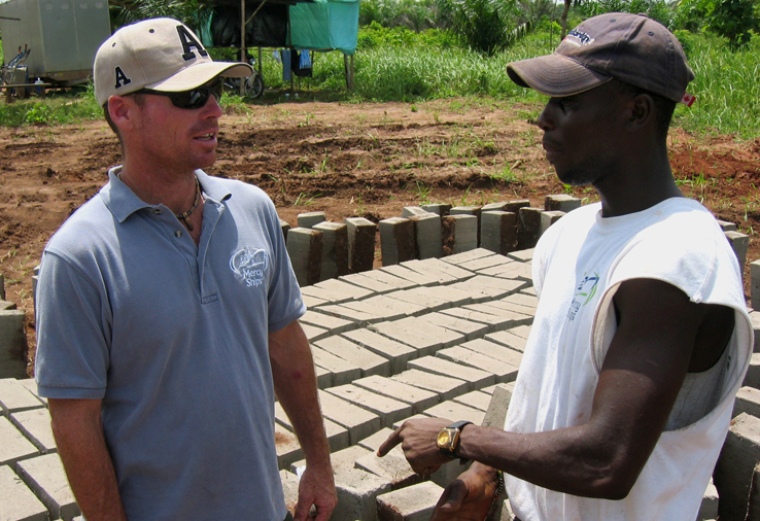
Karl joined the volunteer crew of the Africa Mercy two years ago in Tenerife and sailed to the West African nation of Liberia where the ship was docked for ten months. Last year he spent ten months onboard the ship in another West African nation, Benin, before sailing back to Tenerife and flying home to Australia.
When Karl first joined the crew he worked as a member of the ship's housekeeping department. "I have to give credit to mum for the training I needed to do that," he says. "I did that for two months, but when I returned to Australia I decided to sell my earthmoving business and give two years to working with Mercy Ships on its building construction projects. During the ship's time in Liberia, I worked as an assistant site manager on construction of a medical clinic in Tenegar, a village 45 minutes from the Liberian capital Monrovia. My role changed last year in Benin to construction supervisor, overseeing various building projects, resulting in more paperwork and time in the office rather than on the job."
One project formed part of a Food for Life program, aimed at increasing food security for Benin, with Mercy Ships working in partnership with a local organisation. "My job involved construction of a hostel to house up to 35 students taking part in agricultural training. Food for Life teaches organic agricultural principles. After three months of training, the course participants return to their own villages and teach others the new practices they learned."
Karl first heard about the work done of volunteers serving with Mercy Ships from a woman who spoke at his church on her planned time with the charity. "I didn't think any more about it until about six months later when I was going through a rough patch, and felt it would be best to get away for a while. A mate asked me what I wanted to do. I told him I thought I should go on that Mercy Ships mission thing. He looked up the website, printed out the necessary information and application form, and it rolled on from there."
"My only expectation when I arrived in Africa was that it was something of an adventure, a time for new things, and it certainly has been that. Meeting new people and living among those of different culture can be very challenging. I was also working in countries only a few years out of civil war, countries where I did not speak the language, did not like the food, and where there are so few white people I felt like I stood out like a sore thumb."
"There certainly was a mixed reaction from those around me in Australia when they heard of my decision to serve as a volunteer in West Africa. Some understood and felt it was a great thing to do. Others could not figure it out. I can see it from both sides. God calls us to help the poor, but why leave a place where you are so blessed, give up everything you own and enjoy to go and serve the poor in a foreign country. So I have learnt many things over the past two years. I now have a much greater appreciation of my home nation and just how blessed I am to live where I live."
"In those two years away, I saw many of the problems faced by those who live in West Africa, where most of the world's poorest nations are located …pollution, hunger, greed, laziness, lack of drinkable water, poor accommodation, shortage of jobs, lack of basic health care. Many of the problems have been brought on by inaction and lack of vision, but others have been brought on by those in the developed world who seek the abundance of minerals available, or simply by helping too much."
Karl returns to his family's small cattle farm along the Wilson River at Telegraph Point. He will spend time operating his father's excavator, while waiting for God's timing to take his next step in his future life adventure.
Mercy Ships is a global charity that has operated hospital ships in developing nations since 1978 providing free health care and community development services to the forgotten poor. Following the example of Jesus, Mercy Ships brings hope and healing to the poor.
The Africa Mercy provides the platform for a crew of more than 400 people, drawn from 40 nations, to carry out a range of health and community development projects in some of the world's poorest countries. The ship has six operating theatres, a 78-bed hospital and state-of-the-art facilities enabling volunteer surgeons to provide free surgeries to correct disability, deformity and blindness. At the same time, other volunteers work in the community on dental and health programs, educational, agricultural and construction projects in conjunction with local organisations.
The emphasis is on the needs of the world's poorest nations in West Africa, where the ship provides the platform for services extending up to ten months at a time. Mercy Ships works on land-based projects in Sierra Leone in partnership with other organisations, while teams also work in several nations of Central America and the Caribbean. Mercy Ships Australia, one of 14 international support offices is based on the Queensland Sunshine Coast.
On the web: www.mercyships.org.au